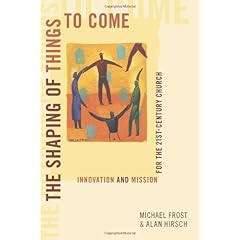Emerging Jargon - APEPT

APEPT Leadership
I haven't been much of a fan of the currently popular Pastor-at-the-top model of church leadership for a long time. In my experience it creates a self fulfilling cycle of sorts, where church members expect pastors to be spiritual Jack-of-all-trades, responsible for the "ministry" of the church while the "laity" (a word I loath) do their bit by rocking up to church on a Sunday. This can create situations where gifted members of the church are unable to be involved in the ministry of the local church, particularly if their gifting is in areas that clash with those traditionally belonging to the pastor. It also creates, either intentionally or otherwise, a perception of two classes of Christians - those who are "called" to ministry and those who are not.
Frost and Hirsch deal with this in part 4 of The Shaping of Things to Come and present what they have called the APEPT model of leadership. APEPT is an acronym based on the 5 leadership giftings of Ephesians 4:1-16; the Apostle, Prophet, Evangelist, Pastor and Teacher.
Basically the APEPT model or mode of leadership recognises the 5 APEPT leadership giftings as crucial to growing and sustaining healthy missional ministries. The authors also see a broader application of these gifts across the general population of the church. While in a specific sense these gifts exist individually for leadership they are also broadly represented across the body.
"...here comes the revolutionary paradigm. What we have called the ministry matrix [the broad application of the APEPT gifts] suggests that the fivefold ministry belongs to, and describes in some way, the whole church".
Frost and Hirsch describe the APEPT gifts in the following way (they make the point that these 5 gifts should not be seen as offices - they are functions based on obvious gifting and not roles or career positions):
While I did not see it explicitly spelled out in the book, I get the impression that Frost and Hirsch are recommending the APEPT leadership ministry belong to the Elders in the local church context and that Elders be recognised based on their APEPT gifting rather than elected in a democratic sense. This would signify a return to what I have always seen as the more biblical way of leading the local church - where the pastor is one of the Elders, not over and above the Elders. It would also signify a sharing of ministry responsibilities rather than simply expecting the Pastor to take on every role, from counsellor to accountant, regardless of gifting or personal strengths and abilities.
- Apostolic function: usually conducted translocally, pioneers new missional works and oversees their development.
- Prophetic function: discerns the spiritual realities in a given situation and communicates them in a timely and appropriate way to further the mission of God's people.
- Evangelistic function: communicates the gospel in such a way that people respond in faith and discipleship.
- Pastoral function: shepherds the people of God by leading, nurturing, protecting and caring for them.
- Teaching function: communicates the revealed wisdom of God so that the people of God learn how to obey all that Christ has commanded them.
Frost and Hirsch promote the APEPT model as the only way for the local church to achieve spiritual maturity and effective mission. I see this as being an important point as Paul does seem to be linking the exercising of APEPT leadership and broader church giftings to Christian maturity in the Ephesians 4 passage.
Hirsch and Frost conclude,
if this is true, it is impossible to estimate what terrible damage the church has done through the loss, even active suppression, of this crucial dimension of New Testament ministry and leadership ... Perhaps the fact that APEPT has not been intentionally nurtured and practiced might have something to do with the immaturity we find in the Western church ... Verse 14 [of Ephesians 4] could well be a description of church history in the West - we have been tossed about, immature, infantile.To me this chapter really just stated what should be the bleedingly obvious, that leadership should be shared and based on obvious spiritual gifting. Yet because of traditions and in-built mechanisms within the human psyche that seek to abrogate our individual spiritual responsibilities, this ideal has been overlooked for centuries.
In the end I really appreciate what Frost and Hirsch have achieved in this book and particularly in this chapter. If the established church is to change in order to become more effective in its mission the first area that is going to have to experience this change is leadership. A move into the missional will not be possible while church ministry is driven from the top and while class distinctions exist within the body.









1 comment:
Thanks, it is blindingly obvious and just as obviously ignored. Everyone is just too comfy doing things tha way they always have been done.
If there was no remuneration, shared leadership would automatically follow. it might be more messy but it is biblical!
Post a Comment